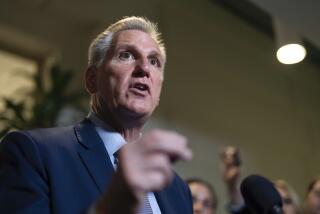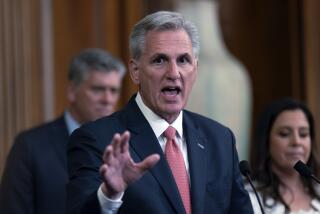Senate GOP Will Permit Campaign Finance Debate
WASHINGTON — Breaking weeks of gridlock, the Senate’s Republican majority Thursday agreed to allow a full debate next year on campaign finance reform. In a quid pro quo, Democrats dropped their legislative machinations that have tied up the chamber since its return from summer vacation.
The breakthrough cleared the way for the Senate to quickly take up some vital pieces of legislation before a planned mid-November recess, including “fast-track” legislation to give President Clinton enhanced authority to negotiate trade agreements and a $3.4-billion Amtrak reauthorization bill to put the government-subsidized railroad on a path toward private ownership by 2002.
In doubt, however, is a popular $145-billion bill for highway projects around the country. Federal funding of road projects ended with the fiscal year on Sept. 30 and a reauthorization bill was among the measures blocked by Democrats because the Senate leadership had prevented the chamber from debating and voting on campaign finance reform legislation.
Late Thursday, Senate Majority Leader Trent Lott (R-Miss.) expressed irritation with the Democrats, saying that he is not inclined to bring up the highway bill until early next year.
In announcing an agreement to take up campaign finance reform no later than March 6, Lott and Minority Leader Tom Daschle (D-S.D.) both exuded bipartisan goodwill, which has been scarce in recent weeks.
In a similar spirit, 26 Democrats joined 43 Republicans shortly afterward in voting to launch a complex legislative process to override President Clinton’s Oct. 6 line-item veto of 38 military projects--including four in California--worth $287 million.
That vote, however, may prove moot because the House has no plans to attempt to override the vetoes. For Congress to override a line-item veto, the House and Senate must approve a “disapproval” measure by simple majorities. After a presumed Clinton veto, a two-thirds majority vote in both houses then would be required to override.
The Senate has accomplished precious little since its August recess, largely because all 45 Senate Democrats have been blocking virtually all floor action--except for the 13 must-do annual appropriations bills--until Republicans would agree to allow unrestricted consideration of campaign finance reform legislation.
“We have won the battle to get the debate on the table,” Sen. Barbara Boxer (D-Calif.) said Thursday. “Now we have to win the debate to get big, unregulated money out of our campaigns.”
Earlier this month, Lott allowed a campaign finance reform bill proposed by Sens. John McCain (R-Ariz.) and Russell D. Feingold (D-Wis.) to come up for debate. But using a legislative ploy, Lott effectively blocked action on the measure.
After a couple days of debate, Lott declared a stalemate and yanked the bill, prompting the Democratic protests that have tied the Senate in knots.
The McCain-Feingold bill would end unlimited “soft-money” contributions and impose other restrictions on campaign fund-raising. All 45 Senate Democrats and four Republicans are co-sponsors of the measure, but they need 60 votes to overcome an expected filibuster.
“It’ll take 60 votes to resolve the issue,” conceded Sen. John F. Kerry (D-Mass.).
Among those who renewed their unalterable opposition to the McCain-Feingold measure Thursday were Lott and Sen. Mitch McConnell (R-Ky.). They vowed to prevent its enactment.
“McCain-Feingold is the wrong thing to do. . . . It’s unconstitutional,” Lott said.
“Philosophically, we’re just not in the same place,” McConnell said, referring to the bill’s backers. “This is an argument about principles. . . . And we have very deep-seated differences.”
He and Lott argued that the bill’s proposed contribution limits would violate the 1st Amendment and free speech.
McCain and Feingold said that they hope the scheduling breakthrough will lead to “serious negotiations” with Lott, McConnell and others to craft a reform package that will win passage.
When the Senate takes up campaign reform again, the first order of business will be a measure to be offered by Lott or an as yet unspecified surrogate. Next, McCain is to be recognized to offer his proposal as an amendment.
The most likely first vote, then, would be a motion to kill the McCain-Feingold amendment. Even if that proposal survived, Lott said, he will have no shortage of legislative tools with which to eventually kill the measure.
*
Feingold and Daschle said that they are happy with the arrangement. “Our key priority is to have an up-or-down vote on McCain-Feingold,” Daschle said. “This will give us an opportunity to have a good debate.”
Feingold acknowledged that campaign finance reform would be “very difficult to get done in an election year.” But he added: “Maybe this next year might be an exception.”
In the House, meanwhile, moderate Democrats continued Thursday to press for a floor vote on the issue.
Their vehicle is a “discharge” petition, which would force the House to vote on the major pending campaign finance reform proposals in the lower chamber--if signed by 218 members. As of Thursday night, 176 Democrats, six Republicans and the lone House independent have signed the petition.
More to Read
Get the L.A. Times Politics newsletter
Deeply reported insights into legislation, politics and policy from Sacramento, Washington and beyond. In your inbox three times per week.
You may occasionally receive promotional content from the Los Angeles Times.










